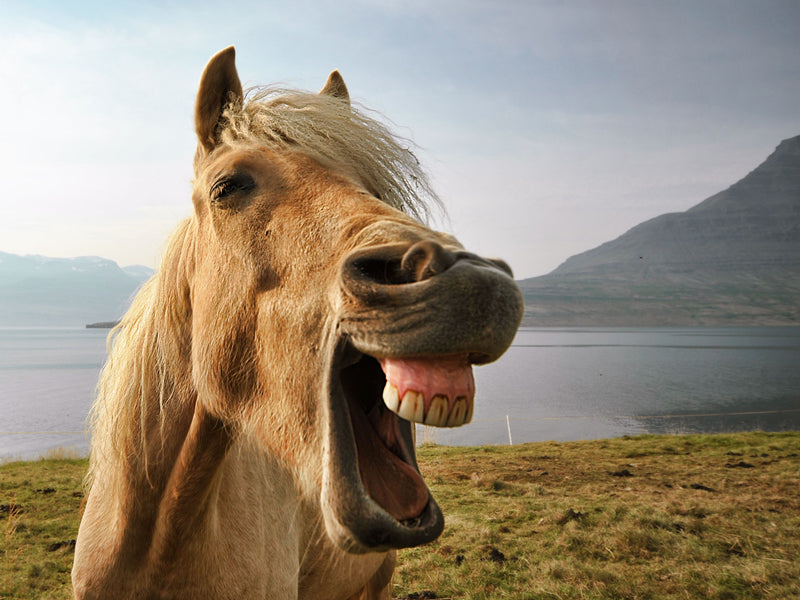Published: August 2020 | Updated: April 2024
Did you know that seeing the dentist is just as important for our horses as it is for us? It’s true, but not necessarily for the same reasons. While horses don’t need their teeth cleaned, they do need them floated on a regular basis, and an equine dentist can also identify any ongoing dental problems and address those, if needed.
How Many Teeth Do Horses Have?
By the age of five, horses have a set of up to 44 permanent teeth (the number is different for mares vs. geldings/stallions), and these teeth will continue to erupt for most of the horse’s life.
Grazing animals by nature, a horse’s front teeth (incisors) work by clipping off grass, hay, or other plant material and the cheek teeth (molars) move in a lateral motion to grind food into a pulp for easier digestion.
How Often Do You Float a Horse’s Teeth?
Horses foraging on fresh pasture may not need as much work on their teeth as horses eating a mostly-hay diet; this is due to the fiber and silica content in fresh grass, which is somewhat abrasive and helps to keep the teeth worn down.
However, any horse can develop sharp edges on the cheek teeth, not to mention unbalanced incisors. If the uneven teeth and sharp edges and/or points aren’t addressed, they can create discomfort for the horse, and he will attempt to relieve the pain by chewing in an unnatural motion. Food may not be digested as well, and over time, the teeth may become diseased or loose and jaw problems may develop.
For this reason, most veterinarians recommend a regular horse teeth floating schedule, at minimum once per year. Horses who are older or more prone to teeth issues may need more teeth floating appointments throughout the year.
What Do Equine Dentists Do?
A good equine dentist will examine your horse’s mouth, identify any broken or diseased teeth, and use hand held or electric tools in order to grind down sharp points or edges as well as balance the incisor teeth (“horse teeth floating”).
The horse is often sedated for this procedure to make it safer for both himself and the equine dentist, and a special tool called a speculum is used to keep the horse’s mouth open during the dental work.
The Connection Between Equine Dental Health and Probiotics
Interestingly enough, there appears to be a connection between equine dental health and the use of probiotics, and though only a few clinical studies have been conducted thus far, the results suggest that probiotics may very well be beneficial in both the prevention and treatment of oral infections and other dental issues.
Like us, horses are susceptible to developing dental caries, a bacterial disease characterized by acid demineralization of the tooth enamel, as well as periodontal disease, a serious gum disease which damages the soft tissue and leads to tooth loss.
Though probiotics ultimately end up in the gut, oral administration of probiotic pastes allows for the likelihood of the beneficial bacteria in the product to coat the teeth and gums, possibly extending some of its health benefits to the oral cavity as well.
Of course, more studies are needed to further explore this connection, but current results certainly point to this conclusion.
By supplementing with equine probiotics, you’re not only enhancing your horse’s gut health, you may be inadvertently improving your horse’s dental health as well, and this will make your equine dentist’s job easier in the long run.
→Shop the #1 veterinarian-formulated and recommended preventative equine probiotics today!←
Read More:

